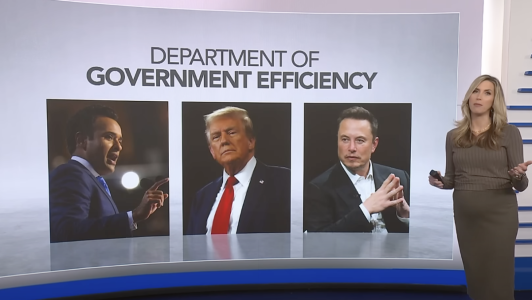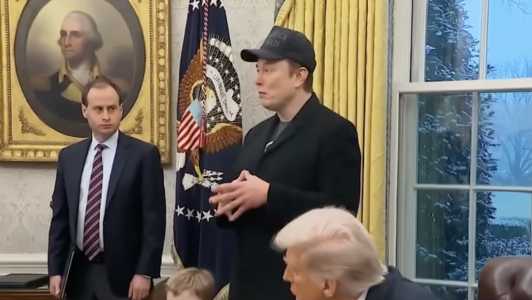Are the efforts paying off? How much did DOGE save you within two months?
- Replies 16
As we settle into the early days of President Trump's administration, a whirlwind of changes is sweeping through the federal government, particularly with the Department of Government Efficiency (DOGE).
This new department, spearheaded by the visionary billionaire Elon Musk, has been hard at work, and their efforts are not going unnoticed.
According to DOGE's own reports, a staggering amount has been saved for taxpayers in just two months. But what does this mean for you, and is it all as straightforward as it seems?
Under the leadership of billionaire Elon Musk, the Department of Government Efficiency (DOGE) has proposed sweeping job cuts across multiple federal agencies, including the Internal Revenue Service and the Department of Education.
One of DOGE’s most drastic recommendations involves largely dismantling the Education Department—a move that has left millions of student loan borrowers uncertain, as they await clarity on how their programs might be handled if responsibilities shift to other agencies.
According to its website, DOGE claims it has saved an estimated $130 billion through a combination of cost-cutting measures, including “asset sales, contract and lease cancellations and renegotiations, fraud and improper payment deletion, grant cancellations, interest savings, programmatic changes, regulatory savings, and workforce reductions.”

That amounts to approximately "$807 per taxpayer," the agency stated.
Part of those savings stem from large-scale layoffs carried out by federal agencies such as the IRS and the Treasury Department.
On February 11, former President Donald Trump signed an executive order instructing all agency heads to “undertake preparations to initiate large-scale reductions in force.”
The Environmental Protection Agency is expected to lay off approximately 1,000 scientists and staff, according to reporting from the Associated Press.
Also read: Could DOGE play a role in your wallet? What this means for Americans’ savings
Earlier in the month, the IRS announced plans to reduce its workforce by around 18,000 employees, representing about 20 percent of its total staff.
Meanwhile, the Department of Education confirmed more than 1,300 layoffs, and the Department of Veterans Affairs is set to cut an even larger number—80,000 positions.
While Elon Musk previously stated that DOGE aimed to slash $2 trillion from the federal budget, he walked back that estimate in January, saying there’s now a "good shot" of achieving half that amount instead.
Alex Beene, a financial literacy instructor at the University of Tennessee at Martin, told Newsweek, "While there's no denying the department is saving the federal government money through its numerous cuts, savings, and layoffs, the current numbers provided may be misleading."
Source: Yahoo Finance / Youtube.
He noted that some government contracts reportedly canceled by DOGE were already "mostly or fully paid out," which could mean that the actual savings are minimal.
Beene also questioned the permanence of many layoffs, saying that some workers are already being reinstated. "In other words, it's going to take many additional months and even years of data to see the real savings DOGE has enacted."
Michael Ryan, founder of MichaelRyanMoney.com, expressed similar skepticism, "These numbers demand intense scrutiny... They’ve also heavily relied on calculating savings based on the maximum possible spending under certain contracts, not realistic expenditures. Add triple-counting and taking credit for contracts ended years ago, and the foundation looks shaky."
He added bluntly: "It’s smoke, mirrors, questionable math. The numbers just don’t hold up under pressure."
Also read: Trump’s new federal workforce policy bring major changes for government employees
Kevin Thompson, CEO of 9i Capital Group, told Newsweek: "At this point, it's unclear whether DOGE has saved Americans any meaningful money."
He said the department seems to be operating "like a business," with most of the reported savings stemming from the elimination of around 300,000 W-2 government jobs. While some of those laid off were already close to retirement—“shifting them into a different, long-term financial liability.”
Thompson acknowledged the move does create “some immediate cost relief.”
While cutting government waste may sound beneficial in theory, Michael Ryan cautioned that the strategy could backfire—especially in revenue-generating agencies like the IRS.

"This isn't just theoretical," Ryan told Newsweek. "The IRS has halted complex audits on high-value targets simply to keep basic operations running."
He emphasized that real savings require careful planning rather than sweeping cuts. "Saving taxpayer money requires prudence, not just a hatchet," Ryan said.
"What we're seeing with DOGE, particularly the IRS cuts, feels like stepping over dollars to pick up dimes. No, let me correct that: it's like setting the dollar pile on fire to grab a few pennies."
In a report by ABC News in February, Musk said that the DOGE will be "maximally transparent." He added, "We will make mistakes. We won't be perfect. But when we make mistakes, we'll fix it very quickly."
Meanwhile, MSN reported Senator Joni Ernst praised DOGE, emphasizing the $15 billion saved due to DOGE's efforts to "cut government waste" such as excessive contracts and misused funds. She calls for her colleagues to prioritize fiscal responsibility and spoke against attempts to prevent these savings.
Read next: IRS employee’s data access request raises concerns over taxpayer privacy

What are your thoughts on DOGE's approach to government efficiency? Do you feel the reported savings are worth the potential risks? Share your insights and experiences with us in the comments below!
This new department, spearheaded by the visionary billionaire Elon Musk, has been hard at work, and their efforts are not going unnoticed.
According to DOGE's own reports, a staggering amount has been saved for taxpayers in just two months. But what does this mean for you, and is it all as straightforward as it seems?
Under the leadership of billionaire Elon Musk, the Department of Government Efficiency (DOGE) has proposed sweeping job cuts across multiple federal agencies, including the Internal Revenue Service and the Department of Education.
One of DOGE’s most drastic recommendations involves largely dismantling the Education Department—a move that has left millions of student loan borrowers uncertain, as they await clarity on how their programs might be handled if responsibilities shift to other agencies.
According to its website, DOGE claims it has saved an estimated $130 billion through a combination of cost-cutting measures, including “asset sales, contract and lease cancellations and renegotiations, fraud and improper payment deletion, grant cancellations, interest savings, programmatic changes, regulatory savings, and workforce reductions.”

The Department of Government Efficiency (DOGE) claims to have saved taxpayers over $100 billion in its first two months, equating to roughly $807 per taxpayer. Image source: WRAL / Youtube.
That amounts to approximately "$807 per taxpayer," the agency stated.
Part of those savings stem from large-scale layoffs carried out by federal agencies such as the IRS and the Treasury Department.
On February 11, former President Donald Trump signed an executive order instructing all agency heads to “undertake preparations to initiate large-scale reductions in force.”
The Environmental Protection Agency is expected to lay off approximately 1,000 scientists and staff, according to reporting from the Associated Press.
Also read: Could DOGE play a role in your wallet? What this means for Americans’ savings
Earlier in the month, the IRS announced plans to reduce its workforce by around 18,000 employees, representing about 20 percent of its total staff.
Meanwhile, the Department of Education confirmed more than 1,300 layoffs, and the Department of Veterans Affairs is set to cut an even larger number—80,000 positions.
While Elon Musk previously stated that DOGE aimed to slash $2 trillion from the federal budget, he walked back that estimate in January, saying there’s now a "good shot" of achieving half that amount instead.
Alex Beene, a financial literacy instructor at the University of Tennessee at Martin, told Newsweek, "While there's no denying the department is saving the federal government money through its numerous cuts, savings, and layoffs, the current numbers provided may be misleading."
Source: Yahoo Finance / Youtube.
He noted that some government contracts reportedly canceled by DOGE were already "mostly or fully paid out," which could mean that the actual savings are minimal.
Beene also questioned the permanence of many layoffs, saying that some workers are already being reinstated. "In other words, it's going to take many additional months and even years of data to see the real savings DOGE has enacted."
Michael Ryan, founder of MichaelRyanMoney.com, expressed similar skepticism, "These numbers demand intense scrutiny... They’ve also heavily relied on calculating savings based on the maximum possible spending under certain contracts, not realistic expenditures. Add triple-counting and taking credit for contracts ended years ago, and the foundation looks shaky."
He added bluntly: "It’s smoke, mirrors, questionable math. The numbers just don’t hold up under pressure."
Also read: Trump’s new federal workforce policy bring major changes for government employees
Kevin Thompson, CEO of 9i Capital Group, told Newsweek: "At this point, it's unclear whether DOGE has saved Americans any meaningful money."
He said the department seems to be operating "like a business," with most of the reported savings stemming from the elimination of around 300,000 W-2 government jobs. While some of those laid off were already close to retirement—“shifting them into a different, long-term financial liability.”
Thompson acknowledged the move does create “some immediate cost relief.”
While cutting government waste may sound beneficial in theory, Michael Ryan cautioned that the strategy could backfire—especially in revenue-generating agencies like the IRS.

DOGE has recommended mass layoffs and the dismantling of federal agencies, including the IRS and the Department of Education, leading to the potential loss of tens of thousands of jobs. Image source: FOX 13 Seattle / Youtube.
"This isn't just theoretical," Ryan told Newsweek. "The IRS has halted complex audits on high-value targets simply to keep basic operations running."
He emphasized that real savings require careful planning rather than sweeping cuts. "Saving taxpayer money requires prudence, not just a hatchet," Ryan said.
"What we're seeing with DOGE, particularly the IRS cuts, feels like stepping over dollars to pick up dimes. No, let me correct that: it's like setting the dollar pile on fire to grab a few pennies."
In a report by ABC News in February, Musk said that the DOGE will be "maximally transparent." He added, "We will make mistakes. We won't be perfect. But when we make mistakes, we'll fix it very quickly."
Meanwhile, MSN reported Senator Joni Ernst praised DOGE, emphasizing the $15 billion saved due to DOGE's efforts to "cut government waste" such as excessive contracts and misused funds. She calls for her colleagues to prioritize fiscal responsibility and spoke against attempts to prevent these savings.
Read next: IRS employee’s data access request raises concerns over taxpayer privacy
Key Takeaways
- The Department of Government Efficiency (DOGE) claims to have saved taxpayers over $100 billion in its first two months, equating to roughly $807 per taxpayer.
- DOGE has recommended mass layoffs and the dismantling of federal agencies, including the IRS and the Department of Education, leading to the potential loss of tens of thousands of jobs.
- Experts are questioning the validity of DOGE's claimed savings, pointing out issues such as misleading figures, short-term layoffs, and unrealistic expenditure estimates.
- There is concern that the cuts, particularly at the IRS, could be counterproductive and result in a loss of revenue that outweighs the immediate cost savings.
What are your thoughts on DOGE's approach to government efficiency? Do you feel the reported savings are worth the potential risks? Share your insights and experiences with us in the comments below!
Last edited:





